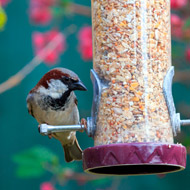Bird-friendly gardens increase window collisions

Tall trees and bird feeders are likely to be a key factor in bird-window collisions.
Tall trees and bird feeders are likely to be a key factor in bird-window collisions, according to a new study.
Research published in Ornithological Applications shows that people who provide better bird habitats might be increasing the risk of bird collisions.
As such, 'these homeowners are likely to be at the forefront in determining ways to reduce collision risk,' say the researchers.
Bird-window collisions are a significant source of mortality for birds in North America. But until now, which type of house and what windows are problematic were poorly understood.
In the study, researchers collected data from citizens across Alberta, Canada, who surveyed their houses daily. The citizens recorded over 34,000 days, of which there were 930 collisions and 102 fatalities.
The researchers found that the presence of a bird feeder and height of vegetation in the front garden increased the number of bird-window collisions.
"This is presumably because these attributes increase the number of birds using a particular garden - as the number of birds in a yard increases, so does the likelihood of a bird-window collision," they write.
They study authors believe that future focus should be given to bird-friendly urban design and developing effective window deterrents.



 The BSAVA has opened submissions for the BSAVA Clinical Research Abstracts 2026.
The BSAVA has opened submissions for the BSAVA Clinical Research Abstracts 2026.